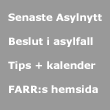ASYLNYTT
Sponsrad av Fridh Advokatbyrå
ARKIV:
EU:s flykting- och gränspolitik
Allmänt om migration, statistik

Asylnytt - Arkiv
Debatt och partipolitik
Migration och gränser
Klipp från media
Länk till information från myndigheter och organisationer
- Arkiveringsdatum 220619:
- Urban Hamid: Det är inte bara Belarus och Turkiet som använder flyktingar som vapen
- Arkiveringsdatum 210808:
- Julien Jeandesboz: Border control degrades migrants by ruining their life expectations
Arkiveringsdatum 220619:
Arbetet Global krönika 22-06-17:
Urban Hamid: Det är inte bara Belarus och Turkiet som använder flyktingar som vapen
Att hänsynslösa politiker använder flyktingar som påtryckningsmedel är inget nytt, skriver Urban Hamid.
En kurdisk vän till mig, peshmergasoldaten Bekes från irakiska Erbil, visar en artikel i sin mobiltelefon. Det står att Belarus har öppnat gränserna för flyktingar som vill vidare in i EU. För några tusen dollar kan de få en flygbiljett, inkvartering på ett lyxhotell och skjuts till gränsen.
Bekes har pratat om att lämna Irak i ett par år. Han som så många andra kurder är missnöjd med korruptionen, nepotismen, den dåliga ekonomin och regimen i allmänhet. Han tänker ta chansen.
(...)
Hela artikeln (Extern länk)
Arkiveringsdatum 220518:
Dagens Nyheter kultur 22-05-10:
Nadia Jebril: Vilket privilegium det är, att få komma hem igen
Vi kan boka en resa och dra. Vi kan flytta. Upptäcka och uppleva det äventyr som världen är. Det är bara att visa sitt svenska pass så öppnas alla dörrar. Men kanske glömmer vi bort det största privilegiet som kommer med fri rörlighet - att vi alltid får komma hem igen.
Var kommer du ifrån? Ser man ut som jag, får man den frågan ganska ofta. Jag vet att den retar många, men frågan har aldrig provocerat mig.
Jag kommer från Lund och jag har mina rötter i Palestina, brukar jag svara. Vill jag att samtalet ska fortsätta, ställer jag frågan tillbaka. Inte för att vara störig, utan för att jag är uppriktigt nyfiken.
(...)
Hela artikeln (Extern länk)
Arkiveringsdatum 220316:
Sveriges Radio 22-03-09:
Migration är alltid en existentiell erfarenhet
Också den som är på flykt har fattat ett medvetet beslut. Gustaf Grapengiesser funderar över hur samhället värderar migranter utifrån skälen för deras uppbrott.
En septemberdag byter jag min vanliga existens med bas utanför Simrishamn, mot en helt annan i Nicosia på Cypern. Väl på plats köper jag en motorcykel, en liten enkel maskin från 90-talet med 400 kubik. I fickan har jag mitt pass som låter mig passera över gränsen till den norra ockuperade delen av ön. En hård, men samtidigt överraskande informell gräns, erkänd av den norra sidan men inte av den södra grek-cypriotiska. Den här informella linjen är också en del av EU:s yttre gräns, men på grund av sin tveksamma status är den fortfarande relativt enkel att passera även för den som inte har sina papper iordning.
Att flytta till en främmande plats, att byta ett kulturellt sammanhang mot ett annat, kan försätta en i ett särskilt tillstånd eller känsloläge. Den amerikanske psykoterapeuten Greg Madison kallar det existentiell migration. På svenska skulle den långa titeln på hans studie av fenomenet från 2010 lyda: Hemmahörandets upphörande - oberättade historier om att lämna hemmet och den globala omlokaliseringens psykologi och han intresserar sig alltså för dem av oss som uttrycker något fundamentalt med vårt val av boställe. I kärnan av den existentiella teoribildningen finns vår förmåga att göra val och jag har onekligen både valt och använt min frihet. Men jag, en privilegierad och tillfällig migrant med nyköpt motorcykel, är inte den enda som rör sig över gränsen mellan öns norra och södra sida. Varje dag anländer asylsökande från olika delar av världen. Man ser dem vid ringmuren runt den gamla delen av staden. I gryningen trängs de på vid Oxi-square i hopp om att få något av de daglönejobb som erbjuds av stadiga män i slitna pick-ups.
(...)
Hela inslaget (Extern länk)
Arkiveringsdatum 220215:
Globalbar Magazine krönika 22-02-04:
Vem kan överge sin mamma i ett flyktingläger?
Hur hade du känt om du tvingats lämna din handikappade mamma på en flyktingförläggning i Grekland? Parul Sharma, som i flera omgångar arbetat som volontär på flyktingförläggningen Moria i Grekland berättar om de bortglömda flyktingarna. Är det verkligen ingen som bryr sig?
Bara tanken att behöva lämna sin mamma på en av Europas största, och en av världens mest horribla flyktingförläggningar väcker skräck inom mig. Jag vet inte hur jag skulle kunna leva med en sådan verklighet, men jag slipper det tack och lov. Däremot består Europas flyktingförläggningar av så många äldre och gamla - framförallt kvinnor vars barn antingen fått asyl i annat europeiskt land och blivit tvungna att flytta - eller som flytt förläggningen för att försöka hitta bättre livsvillkor. Det senare är vanligare än vi tror, flykten från förläggningen. De som flyr, flyr med förhoppning om att nästa EU-land även tar emot deras äldre. "Min son Ahmed flydde lägret och är nu i Frankrike, han ska söka asyl där och sedan åker jag till honom", berättade Hamida för mig.
(...)
Hela artikeln (Extern länk)
Arkiveringsdatum 210808:
Statewatch News 21-07-19:
"European border control degrades migrants by ruining their life expectations"
An interview with Julien Jeandesboz, expert on border control, about the nature of "zoopolitics", changes to the Eurodac biometric database, the development of the European Travel Information and Authorisation System, and vaccination passports.
Data and artificial intelligence are shaping the future of humanity in ways that the society cannot yet understand . All over the world there are academics, international agencies, banks, research centres and states that have acknowledged the wonders and risks of digitalised and data-based economies, but the downsides of dependence on data storage systems remains a major concern, especially when it comes to migrants' rights. These rapid changes often go unnoticed due to the wide range of regulations and political trends involved in the evolution to digital societies, which nowadays also includes vaccination passports in the new EU post-pandemic travel regime.
One of the most quoted experts on border control and surveillance mechanisms is Julien Jeandesboz, who is currently working at the Université Libre de Bruxelles. In this interview, Jeandesboz talks about the nature of territoriality and the dark side of detention centres, the blurred responsibility to migrants and refugees in the European Union (EU) and the transformation of the Eurodac database from a system for storing data on asylum seekers to an immigration enforcement mechanism. He also discusses how a new regulation in the making will be used to profile visa applicants by applying "information proxies" that could deny someone's ability to reach into European soil.
Jeandesboz strives to understand and explain the complexities of such mechanisms, but his main objective is nevertheless simple: how can we pull these systems' plugs if they are proven to be erroneous, harmful, and inhuman? The expert makes the following analogy: the development of these surveillance mechanisms is comparable to the stockpiling of nuclear weapons by the USA and USSR in the midst of the Cold War.
Is it the state that makes the border or the border that makes the state?
(...)
Hela artikeln (Extern länk)
Källor: Informationen på denna sida är hämtad från följande källor (externa länkar): EU (kommissionen, ministerrådet, parlamentet och domstolen), Europarådet (mr-kommissionären, domstolen, kommittén mot tortyr), FN:s flyktingkommissariat UNHCR, FN:s kommitté mot tortyr m.fl. FN-organ, Sveriges Radio, SvT, andra svenska media via Nyhetsfilter och pressmeddelanden via Newsdesk, utländska media till exempel via Are You Syrious och Rights in Exile, internationella organisationer som Amnesty International, Human Rights Watch, ECRE, Statewatch och Picum, organisationer i Sverige som Rädda Barnen, Asylrättscentrum, Svenska Amnesty, FARR och #vistårinteut samt myndigheter och politiska organ som Migrationsverket, Sveriges domstolar, JO, Justitiedepartementet m.fl. departement och Sveriges Riksdag.
Bevakning: Hjalte Lagercrantz och Sanna Vestin. Sammanställning: Sanna Vestin. Asylnytt är ett ideellt projekt. Sponsring avser prenumerationsavgifter. Tips emottages tacksamt.

 innehåll
innehåll